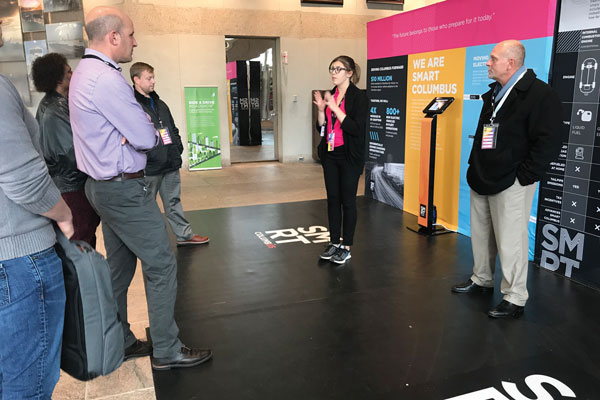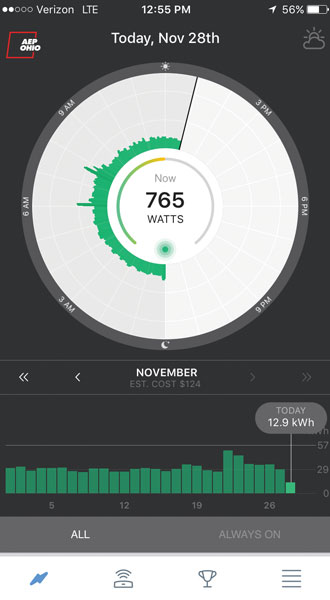Columbus Tackles Smart City Initiatives

Columbus, Ohio, is using public-private partnerships and $50 million from the U.S. Department of Transportation and Vulcan Inc. to revolutionize its transportation infrastructure.
ON JUNE 23, 2016, Columbus, Ohio, beat out 77 other U.S. cities to become the winner of the U.S. Department of Transportation’s Smart City Challenge. The $50 million prize was awarded to Columbus to revolutionize its transportation infrastructure and transform it into the first “smart city” in the country.
Representatives from the city of Columbus, the Columbus Partnership, and other for-profit and nonprofit partners are now working side by side in a coworking space, the Columbus Idea Foundry, which is dedicated to supporting creative workers and entrepreneurs. Although each member of the team comes from a well-established organization, when they come together as Smart Columbus they consider themselves a startup.
Where to Start?
Smart Columbus is spearheading a host of smart city initiatives that aim to improve multimodal trip planning, create a smart operating system to integrate data from multiple transit sources, connect residents to transit hubs using autonomous vehicles and make trucking more efficient. All of its projects are still in the planning phase. According to Mike Stevens, the city’s chief innovation officer, members of the Smart Columbus team want to affirm the assumptions they made in their Smart City application before implementing any projects. “We only want to create solutions for problems that actually exist,” he adds. Therefore the city is first engaging the users who are targeted by each project. In fall 2017, city officials generated a series of “user stories” from their conversations with residents that will guide the implementation of several projects in 2018.

Smart Columbus is hosting “Ride-N-Drive Roadshow” events at which participants learn about electric vehicles and are able to test drive or ride in an EV.
Smart Columbus
One reason Columbus’ application stood out to the U.S. Department of Transportation (USDOT) was its focus on improving the quality of life in economically distressed neighborhoods. After winning the challenge, Columbus and the USDOT refined the project list, winnowing it down from 15 projects to nine by combining some and dropping others.
One project that was added, however, demonstrates the city’s commitment to social equity: a prenatal transit program to enhance health care support in Linden, one of its poorest neighborhoods. The program aims to help pregnant mothers get to necessary doctor’s appointments. “We face one of the highest infant mortality rates in the country, and the worst in the state,” says Mark Patton, vice president of the Columbus Partnership. By creating a multimodal transit app and consolidated payment system, Smart Columbus hopes to improve access to public transit and help residents overcome difficulties getting to and from transit hubs, known as “first-mile/last-mile challenges.”
Focus on Electric Vehicles
While $40 million of the grant money came from USDOT, Vulcan Inc., a Paul G. Allen company dedicated to “improving our planet through catalytic philanthropy,” also contributed $10 million to the Smart City Challenge. Its portion of the funding is dedicated to decarbonization, electric vehicle (EV) charging infrastructure and increasing the adoption of electric vehicles. By 2020, Smart Columbus plans to reduce single-occupancy commutes to major workplaces by 10 percent and increase EV sales from 0.37 percent of cars sold to at least 1.8 percent – a more than fourfold increase that would put 3,200 additional EVs on the road.
To encourage residents to drive electric, Smart Columbus is taking a “Ride-N-Drive Roadshow” to the seven counties of central Ohio over the next three years. Its goal is to host 150 roadshow events, the first 11 of which were held in fall 2017. Roadshow events are cohosted by local employers and showcase 12 of the latest plug-in electric and hybrid vehicle models. Participants learn how to charge an electric vehicle and about alternatives to driving to work. They are even able to test drive or ride along in an EV. At the first 11 events, 810 participants test drove an EV and an additional 113 rode along as passengers.
Leveraging the Private Sector
Columbus is proud of what it calls “the Columbus way,” a unique commitment its citizens have to prioritizing collective goals and working together to solve problems. Bret Kaufman, principal of Kaufman Development, which develops mixed-use neighborhoods, says that the city and developers are “not at loggerheads” in Columbus the way they often are in other places. He has received a substantial amount of support from the mayor’s office as well as from business leaders over the years.
“I’ve had CEOs of banks and some of the largest companies in this city – and the world – invite me to their homes to talk about an issue I’m grappling with,” Kaufman says. This penchant to help one another stems from a desire to do what is best for the city. “People bend over backwards to help because they want others to succeed and help the city grow and prosper.”
The Columbus Partnership is proof of the Columbus way; this nonprofit organization has institutionalized how the city’s citizens work together. The partnership is a membership organization of CEOs from the city’s 60 largest companies, which employ approximately 14 percent of the city’s workforce. For the last 15 years, city officials have regularly communicated and cooperated with the private sector through the partnership. It is no surprise, then, that the partnership is an integral part of Smart Columbus.

American Electric Power is replacing analog meters with smart meters that enable consumers to access real-time energy information through a mobile app.
Smart Columbus
While the Vulcan grant is incentivizing the purchase of electric vehicles for the city’s fleet, Smart Columbus also wants to encourage individuals and private fleets to use EVs. The Columbus Partnership has asked its corporate members to lead in this area by personally buying these clean vehicles. Its goal is for 50 Columbus Partnership executives to drive EVs, and it expects about 24 to be on-board by the second quarter of 2018. More than 44 companies in the partnership have also signed up to be “acceleration partners” and will install EV charging stations at their locations, create corporate fleets of EVs and educate their workforces about smart mobility.
Complementary Efforts
The private sector is also supporting Smart Columbus in other ways. Brandi Braun, the city’s deputy innovation officer, explains that “There are additional projects throughout the state which are independent, known as ‘aligned investments,’ being pursued by private organizations that see an opportunity in and are inspired by the Smart Columbus initiative, which accelerate our progress.” Smart Columbus calculates that in addition to the Smart City Challenge grant money, the public and private sectors have committed another $502 million to projects across the city that will complement Smart Columbus initiatives and help to scale and sustain them into the future. But Mayor Andrew Ginther is not stopping there. His goal is to increase the value of these additional investments to $1 billion.
One of Smart Columbus’ acceleration partners, American Electric Power (AEP), plans to commit $175 million to the Smart Columbus Acceleration Fund for projects that are separate but complementary to Smart Columbus efforts. AEP plans to modernize the Columbus electric power grid by implementing technologies such as smart meters, EV charging stations and a demonstration microgrid. Ryan Houk, smart city project manager for AEP Ohio, says AEP plans to install more than a half million smart meters in the Columbus area by mid-2019 and an additional 394,000 in the rest of its territory, approximately half of Ohio, by 2021.
These smart meters will enable consumers to access real-time energy information through a mobile application, “It’s Your Power.” In addition, AEP Ohio is in the process of creating a rebate program that will reduce the up-front costs of installing EV charging stations at workplaces, multifamily buildings and public sites to help spur the construction of EV charging infrastructure and stimulate the market for EVs.
Results
While Kaufman says it is too early to have a clear sense of how the Smart Columbus initiative will impact commercial real estate developers in the area, it is clear that Smart Columbus and the city will take a supportive posture. “There is already a rebate program in place to help offset the cost of electric charging stations for new multiunit residential projects. Smart Columbus has created a pot of money to allocate to new construction projects that want to put new charging stations in their projects” – a move that will surely encourage the development community to embrace electrification initiatives.
By Camille Galdes, an urban policy writer and researcher, camille.galdes@gmail.com


